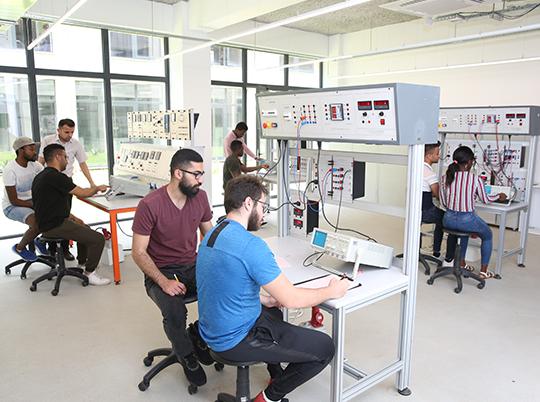Electrical and Electronics Engineering (PhD)



About the Program
Electrical and electronic engineering is at the center of the high technology research and development activities. This program design and produce many equipment related to communication, health, security, comfort and good quality life conditions. In the Electrical and Electronic Engineering Ph.D. program students can carry out research and development activities in the fields of electrical power systems, telecommunications, circuits and systems, electromagnetic fields and microwave technology, and control and robotic systems. In the selected research area, students learn in-depth design and solution techniques with effective knowledge of equipment and methods. Students can create effective solutions by deeply understanding the design techniques that need to be applied for the refinement of projects in their chosen field of specialization, and they may have comprehensive knowledge of development tools and methods. For this purpose, students are able to access many well-known scientific sources online (such as IEEE, ACM, etc.) and thus acquire up-to-date knowledge through many scientific journals.
Education Opportunities
The program contains of research areas like communication technologies (coding techniques, modulation techniques, communication networks), electric energy production, transmission, distribution methods and techniques, electromagnetic fields and microwave techniques (micro-strip antennas, FDTD analysis, electromagnetic scattering), with signal and image processing (filtering methods, face recognition, video coding). Students develop themselves by enrolling in the courses they are interested in. In addition to being able to design with state-of-the-art devices, research and development can be done in the field of electrical and electronics engineering by using simulation methods by using the package programs which are ready to use in high-capacity computers. Students are provided with laboratory facilities for collecting and synthesizing experimental data and thus, obtaining many scientific results. In addition, students are gain experience in publishing the scientific studies they have conducted under the supervision of a faculty member.

Career Areas
Graduates of this program; can easily find jobs in the private sector or in many public companies. They can also pursue careers in areas such as project definition, development, research and development (R&D), work measurement, material management, production planning and control, quality control and business administration and management, especially in high technology companies. The sectors they can work in include but are not limited to wireless communication systems, fiber optic communication systems, renewable energy sources, energy efficiency, design and production of electric cars, control and robot systems. In addition, students who have graduated from this program can have the opportunity to become a faculty member at a university.
Contact
Institute of Graduate Studies and Research
Graduate Sciences and Education Center, GE106
Tel: +90 392 671 1111 Extension: 2776
Institute E-mail: ciu-institute@ciu.edu.tr
Compulsory Courses
First Semester
ELECTIVE COURSE
Course code
EELE6X1Credit
3Theoretical
3Practical
0Ects
8ELECTIVE COURSE
Course code
EELE6X2Credit
3Theoretical
3Practical
0Ects
8ELECTIVE COURSE
Course code
EELE6X3Credit
3Theoretical
3Practical
0Ects
8Second Semester
THESIS
Course code
EELE600Credit
0Theoretical
0Practical
0Ects
160PHD QUALIFICATION
Course code
EELE650Credit
0Theoretical
0Practical
0Ects
20SEMINAR
Course code
EELE690Credit
0Theoretical
0Practical
0Ects
4ELECTIVE COURSE
Course code
EELE6X4Credit
3Theoretical
3Practical
0Ects
8ELECTIVE COURSE
Course code
EELE6X5Credit
3Theoretical
3Practical
0Ects
8ELECTIVE COURSE
Course code
EELE6X6Credit
3Theoretical
3Practical
0Ects
8Philosophy of Science
Course code
PHIL601Credit
3Theoretical
3Practical
0Ects
8Elective Courses
NEURAL NETWORKS MODELLING AND APPLICATIONS
Course code
EELE630Credit
3Theoretical
3Practical
0Ects
OPTICAL COMMUNICATION NETWORK
Course code
EELE611Credit
3Theoretical
3Practical
0Ects
SOLAR ENERGY SYSTEMS
Course code
EELE625Credit
3Theoretical
3Practical
0Ects
ADVANCED TOPICS IN IMAGE PROCESSING
Course code
EELE603Credit
3Theoretical
3Practical
0Ects
PROBABILITY THEORY AND STOCHASTIC PROCESSES
Course code
EELE612Credit
3Theoretical
3Practical
0Ects
ADVANCED POWER SYSTEM HARMONICS
Course code
EELE637Credit
3Theoretical
3Practical
0Ects
ADVANCED POWER ELECTRONIC SYSTEMS
Course code
EELE639Credit
3Theoretical
3Practical
0Ects
WIRELESS NETWORKS AND MOBILE SYSTEMS
Course code
EELE609Credit
3Theoretical
3Practical
0Ects
COMPUTER NETWORK TOPOLOGY
Course code
CMPE624Credit
3Theoretical
3Practical
0Ects
INTEGRATION OF RENEWABLES
Course code
ENRE512Credit
3Theoretical
3Practical
0Ects
FUNDAMENTALS OF ENERGY SYSTEMS OPTIMIZATION
Course code
ENRE533Credit
3Theoretical
3Practical
0Ects
ADVANCED TOPICS IN SOFTWARE ENGINEERING
Course code
CMPE555Credit
3Theoretical
3Practical
0Ects
DIGITAL IMAGE PROCESSING
Course code
EELE526Credit
3Theoretical
3Practical
0Ects
0RESEARCH METHODS
Course code
EMNT525Credit
3Theoretical
3Practical
0Ects
0ADVANCED TOPICS IN INFORMATION SECURITY
Course code
MISY660Credit
3Theoretical
3Practical
0Ects
RENEWABLE ENERGY TRANSPOTATION SYSTEMS
Course code
EELE623Credit
3Theoretical
3Practical
0Ects
POWER SYSTEMS PROTECTION AND CONTROL
Course code
EELE638Credit
3Theoretical
3Practical
0Ects
ENERGY DECISION SUPPORT TOOLS
Course code
ENRE624Credit
3Theoretical
3Practical
0Ects
ADVANCED RESEARCH METHODS FOR ENGINEERING
Course code
ENGI660Credit
3Theoretical
3Practical
0Ects
8ADVANCES ON VLSI DESIGN
Course code
EELE544Credit
3Theoretical
3Practical
0Ects
PATTERN RECOGNITION
Course code
CMPE546Credit
3Theoretical
3Practical
0Ects
SOLAR POWER DESIGN
Course code
ENRE507Credit
3Theoretical
3Practical
0Ects
SYSTEM MODELLING SMULATION
Course code
CMPE571Credit
3Theoretical
3Practical
0Ects
HIGH VOLTAGE TECHNIQUES
Course code
EEE456Credit
0Theoretical
0Practical
0Ects
COMMUNICATION SYSTEMS
Course code
EEE362Credit
0Theoretical
0Practical
0Ects
HIGH VOLTAGE UNDERGROUND CABLES
Course code
EELE635Credit
3Theoretical
3Practical
0Ects
ADVANCED APPROXIMATION THEORY
Course code
EELE663Credit
3Theoretical
3Practical
0Ects
Philosophy of Science
Course code
PHIL601Credit
3Theoretical
3Practical
0Ects
8ANALOG FILTER DESIGN
Course code
EELE568Credit
3Theoretical
3Practical
0Ects
0ADVANCED CRYPTOGRAPHY AND DATA SECURITY
Course code
CMPE625Credit
3Theoretical
3Practical
0Ects
WIRELESS NETWORKS AND MOBILE SYSTEMS
Course code
CMPE627Credit
3Theoretical
3Practical
0Ects
ADVANCED TOPICS IN COMPUTER ARCHITECTURE
Course code
CMPE636Credit
3Theoretical
3Practical
0Ects
MODERN ECONOMIC ISSUES IN ENERGY SYSTEMS
Course code
ENRE527Credit
3Theoretical
3Practical
0Ects
WIRELESS COMMUNICATION SYSTEMS
Course code
EELE464Credit
0Theoretical
0Practical
0Ects
ELECTROMAGNETIC THEORY II
Course code
EEE331Credit
0Theoretical
0Practical
0Ects
POWER TRANSMISSION AND DISTRIBUTION
Course code
ENRE401Credit
0Theoretical
0Practical
0Ects
ELECTRICAL MACHINERY
Course code
EEE453Credit
0Theoretical
0Practical
0Ects
SYSTEMS ENGINEERING
Course code
CVLE601Credit
3Theoretical
3Practical
0Ects
5SIGNALS AND SYSTEMS
Course code
EEE321Credit
0Theoretical
0Practical
0Ects
ELECTRONICS II
Course code
EEE342Credit
0Theoretical
0Practical
0Ects
DESIGN OF ZERO EMISSION 100% RENEWABLE CITIES
Course code
ENRE537Credit
3Theoretical
3Practical
0Ects
COMPUTER NETWORKS AND COMMUNICATIONS
Course code
EELE529Credit
3Theoretical
3Practical
0Ects
Students who are interested in pursuing advanced graduate studies leading to a master’s, doctoral degree or professional doctorate degree for the Fall and Spring semesters every year. Applicants can directly apply online to our graduate programs using the application portal.
TR Applicants- Required documents:
- Bachelor’s and Master’s Degree Diploma
- Bachelor’s and Master’s Degree transcripts for each completed academic term/year.
- Valid ALES result in document (must not exceed 5 years),
- Documents to prove English proficiency for English language departments,
- Scanned copy of passport or identity card.
Click for detailed admission requirements information.
TRNC Applicants- Required documents:
- Bachelor’s and Master’s Degree Diploma
- Bachelor’s and Master’s Degree transcripts for each completed academic term/year.
- Documents to prove English proficiency for English language departments,
- Scanned copy of passport or identity card.
Click for detailed admission requirements information.
Students who are interested in pursuing advanced graduate studies leading to a master’s, doctoral degree or professional doctorate degree for the Fall and Spring semesters every year. Applicants can directly apply online to our graduate programs using the application portal.
International Applicants- Required documents:
- A valid Bachelor’s Degree and transcripts for each completed academic term/year.
- A valid Master’s Degree and transcripts for each completed academic term/year.
- Evidence of English Language competence: TOEFL (65 IBT) or IELTS (5.5). Students without these documents will take the CIU English proficiency exam on campus following arrival.
- Scanned copy of international passport/birth certificate
- CV
- PhD research proposal
- Fully completed and signed CIU Rules and Regulations document (which can be downloaded during the online application)
Click for detailed admission requirements information.
Cyprus International University provides academic scholarships for its students as an incentive for success, with most students benefiting from 50%, 75% or 100% scholarships or discounted tuition fees. Click for more information.
Tuition Fees are determined at the beginning of each academic year. Candidate students who are entitled to enroll in CIU can learn their fees in line with the Tuition Fee Calculation system.